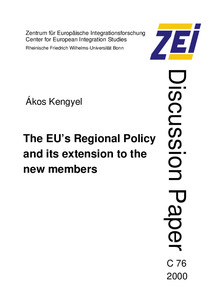Kengyel, Ákos: The EU's regional policy and its extension to the new members. Bonn: Zentrum für Europäische Integrationsforschung (ZEI), 2000. In: ZEI Discussion Paper, C76.
Online-Ausgabe in bonndoc: https://hdl.handle.net/20.500.11811/10151
Online-Ausgabe in bonndoc: https://hdl.handle.net/20.500.11811/10151
@techreport{handle:20.500.11811/10151,
author = {{Ákos Kengyel}},
title = {The EU's regional policy and its extension to the new members},
publisher = {Zentrum für Europäische Integrationsforschung (ZEI)},
year = 2000,
series = {ZEI Discussion Paper},
volume = C76,
note = {All candidate countries from Central and Eastern Europe will be new members with a per capita GDP below the EU average and even below the least developed present member states. However, GDP per capita at purchasing power parity of some candidate countries is close to that of some member states (Slovenia 68 per cent, Czech Republic 63 per cent of the EU average)1. The number of applicant countries and the differences between them are greater than ever before, and they will all be net recipients of the common budget. European solidarity will become more important than ever in achieving the major goal of reducing disparities in levels of development explicitly set by Article 130a.
The new members would like to get access to the Structural Funds as a major instrument in supporting their modernisation process. Although future resource transfer is not the only reason for becoming a full member of the EU, this field plays a very important role for the Central and Eastern European countries (CEECs). There is no doubt that it is of utmost importance for the historically undercapitalised candidate countries to accelerate their modernisation process, among others, also by having access to EU funds.
This paper will focus on the preparation of the European Union for Eastern enlargement in a budgetary sense. It will deal with the role of regional development subsidies within the Union and look through the gradual development of the common regional policy and its reforms. It will provide a critical survey of the Agenda 2000 and discuss decisions of the Berlin European Council on the future of structural funds, with special regard to the financing of enlargement.},
url = {https://hdl.handle.net/20.500.11811/10151}
}
author = {{Ákos Kengyel}},
title = {The EU's regional policy and its extension to the new members},
publisher = {Zentrum für Europäische Integrationsforschung (ZEI)},
year = 2000,
series = {ZEI Discussion Paper},
volume = C76,
note = {All candidate countries from Central and Eastern Europe will be new members with a per capita GDP below the EU average and even below the least developed present member states. However, GDP per capita at purchasing power parity of some candidate countries is close to that of some member states (Slovenia 68 per cent, Czech Republic 63 per cent of the EU average)1. The number of applicant countries and the differences between them are greater than ever before, and they will all be net recipients of the common budget. European solidarity will become more important than ever in achieving the major goal of reducing disparities in levels of development explicitly set by Article 130a.
The new members would like to get access to the Structural Funds as a major instrument in supporting their modernisation process. Although future resource transfer is not the only reason for becoming a full member of the EU, this field plays a very important role for the Central and Eastern European countries (CEECs). There is no doubt that it is of utmost importance for the historically undercapitalised candidate countries to accelerate their modernisation process, among others, also by having access to EU funds.
This paper will focus on the preparation of the European Union for Eastern enlargement in a budgetary sense. It will deal with the role of regional development subsidies within the Union and look through the gradual development of the common regional policy and its reforms. It will provide a critical survey of the Agenda 2000 and discuss decisions of the Berlin European Council on the future of structural funds, with special regard to the financing of enlargement.},
url = {https://hdl.handle.net/20.500.11811/10151}
}






